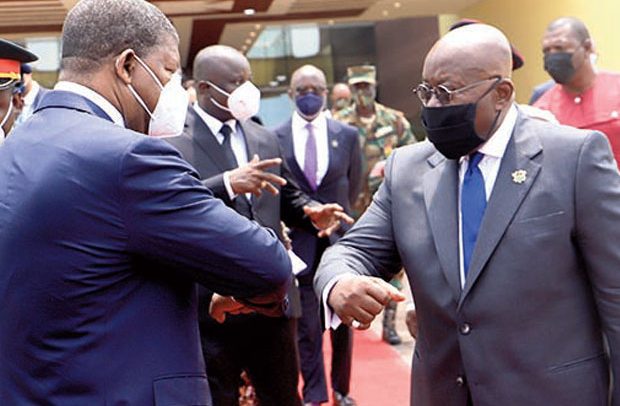President Akufo-Addo welcoming João Manuel Gonçalves Lourenço, President of Angola to the Jubilee House for a state visit. Picture by Gifty Ama Lawson
Ghana and Angola have opened a new page in their friendship following the signing of a Memorandum of Understanding (MoU) to establish a consultative mechanism to hold regular discussions on several areas of cooperation and development.
They include the areas of mining and hydrocarbon development, agriculture, education, tourism, transportation, and maritime security on regular basis for the mutual benefit of both countries.
The MoU was signed when the visiting Angolan President, João Manuel Gonçalves Lourenço called on President Akufo-Addo at the Jubilee House (presidency) yesterday as part of his three-day visit to Ghana.
With Ghana’s experience in sectors such as mining and cocoa production and Angola’s reputation in oil and gas development, the governments of both countries believe they can derive maximum benefits from such collaborations.
Both Presidents witnessed the signing of the MoU by their respective Ministers of Foreign Affairs.
Prior to the signing of the MoU, President Akufo-Addo held at closed-door tete-a-tete with his Angolan counterpart before holding bilateral talks.
At that meeting, government officials said the two leaders highlighted the need to foster close collaborations and exchange of ideas and experiences in various sectors.
Despite the similarities in their values and history, they believe they have a lot to learn from each other and underscored the need to collaborate to find solutions to common challenges.
They also spoke about the need to strengthen cooperation to address the security challenges at the Gulf of Guinea, which has literally become an albatross around the neck of the African continent.
Considering the level of resources needed to keep the Gulf safe, the officials of the two countries stressed the need to invite all 21 countries sharing the Gulf of Guinea on board to help keep the Gulf safe.
They equally pledged to exchange ideas and knowledge to develop the fishing industries of both countries for the benefit of their people.
Both Presidents expressed the commitment to improve transportation between their two countries by establishing a direct route from Accra to Luanda.
On education, the two leaders believe there were prospects of exchanging English teachers from Ghana to Angola and tutors from Angola to teach Portuguese in Ghana.
President João Lourenço spoke highly of Ghana’s tourism, mining, and cocoa production sectors, indicating that the collaboration would be an opportunity for his country to learn from Ghana
He said the mining industry in Angola was still at its development stage, and welcomed investors from Ghana to share their knowledge and experiences in mining to help develop the Angolan mining sector.
With Ghana’s experience in cocoa production on the international market, he noted that Angola could learn from Ghana’s success to develop its coffee production and regain its global position as a major coffee producer.
President João Lourenço also stressed the need for the two countries to explore the possibilities of collaboration to develop their agro livestock industries.
The Angolan leader commended Ghana’s democratic credentials, indicating that his country supported Ghana’s candidature to host the secretariat of the African Continental Free Trade Area (AfCFTA) due to the country’s stable “behaviour” on the continent.
President Akufo-Addo, on his part, described the Angolan leader’s visit, which is a reciprocal gesture of his visit to Angola in 2019, as a successful step in deepening the bilateral ties between the two countries.
He was full of admiration for Angola’s hydrocarbon industry and expressed optimism that the collaboration would enable Ghana learn from the experience of the Central African nation.
President Akufo-Addo, later in the evening, hosted the Angolan leader to a State Banquet at the Jubilee House.
President João Lourenço is expected to address Parliament today before leaving for his country tomorrow.
By Charles Takyi-Boadu


